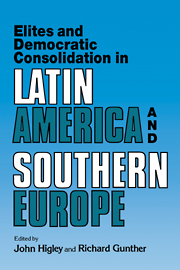Book contents
- Frontmatter
- Contents
- About the contributors
- Preface
- 1 Introduction: elite transformations and democratic regimes
- 2 Spain: the very model of the modern elite settlement
- 3 Elite settlements and democratic consolidation: Colombia, Costa Rica, and Venezuela
- 4 Mexico's elite settlement: conjuncture and consequences
- 5 Elite unification and democratic consolidation in Italy: a historical overview
- 6 The role of civil–military pacts in elite settlements and elite convergence: democratic consolidation in Uruguay
- 7 Patterns of elite negotiation and confrontation in Argentina and Chile
- 8 Elites in an unconsolidated democracy: Peru during the 1980s
- 9 Brazil's political transition
- 10 Redefining the Portuguese transition to democracy
- 11 The Dominican case
- 12 Elites and democratic consolidation in Latin America and Southern Europe: an overview
- Index
12 - Elites and democratic consolidation in Latin America and Southern Europe: an overview
Published online by Cambridge University Press: 05 June 2012
- Frontmatter
- Contents
- About the contributors
- Preface
- 1 Introduction: elite transformations and democratic regimes
- 2 Spain: the very model of the modern elite settlement
- 3 Elite settlements and democratic consolidation: Colombia, Costa Rica, and Venezuela
- 4 Mexico's elite settlement: conjuncture and consequences
- 5 Elite unification and democratic consolidation in Italy: a historical overview
- 6 The role of civil–military pacts in elite settlements and elite convergence: democratic consolidation in Uruguay
- 7 Patterns of elite negotiation and confrontation in Argentina and Chile
- 8 Elites in an unconsolidated democracy: Peru during the 1980s
- 9 Brazil's political transition
- 10 Redefining the Portuguese transition to democracy
- 11 The Dominican case
- 12 Elites and democratic consolidation in Latin America and Southern Europe: an overview
- Index
Summary
This volume has analyzed the roles played by elites in recent transitions to democracy in Latin America and Southern Europe. Its thesis has been that the consolidation of a new democracy requires the establishment of elite consensus and unity, as well as extensive mass participation in the elections and other institutional processes that constitute procedural democracy. The primary focus has been on the elite variable because we regard this as logically and factually prior to the existence of regime stability or instability, to peaceful or disruptive mass mobilization and participation, and thus to the several types of democratic regimes that we have distinguished – consolidated, unconsolidated, stable limited, and pseudo-democracies. Elite consensus requires agreement on the worth of political institutions and on the rules of the political game that is played within and around those institutions. Elite unity involves formal and informal communication networks that encompass all or most elite groups and that enable them to defend and promote their interests through access to central decision-making processes. Historically, most national elites have lacked consensus and unity; the result has been unstable regimes switching between varieties of authoritarian rule and various forms of pseudo- or unconsolidated democracy, with shifts from one to another occurring through irregular power seizures by the groups that make up such disunified elites. For a disunified elite to achieve consensus and unity, there must be a fundamental transformation in elite orientation and structure.
- Type
- Chapter
- Information
- Publisher: Cambridge University PressPrint publication year: 1991
- 10
- Cited by

